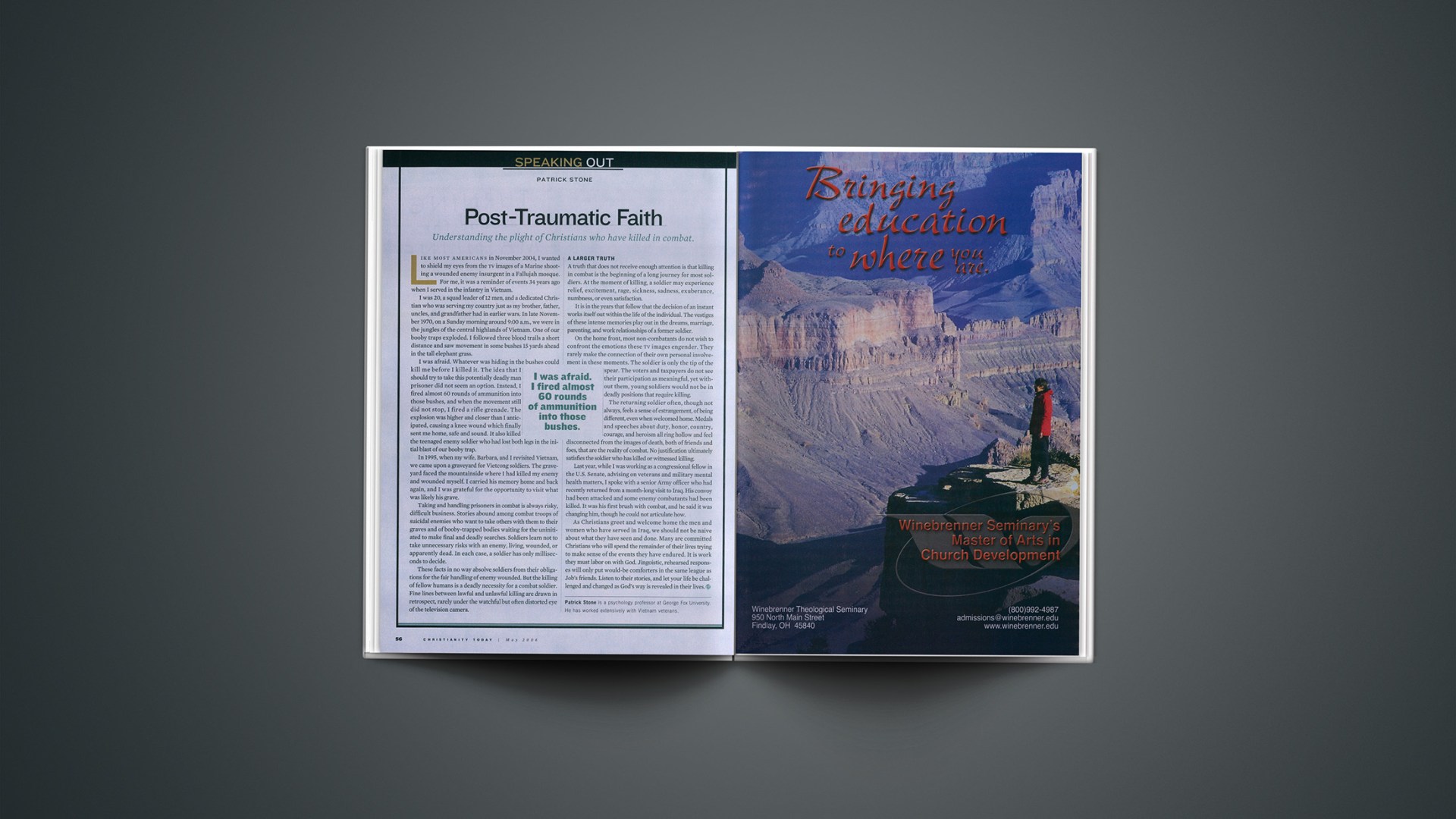Like most Americans in November 2004, I wanted to shield my eyes from the TV images of a Marine shooting a wounded enemy insurgent in a Fallujah mosque. For me, it was a reminder of events 34 years ago when I served in the infantry in Vietnam.
I was 20, a squad leader of 12 men, and a dedicated Christian who was serving my country just as my brother, father, uncles, and grandfather had in earlier wars. In late November 1970, on a Sunday morning around 9:00 a.m., we were in the jungles of the central highlands of Vietnam. One of our booby traps exploded. I followed three blood trails a short distance and saw movement in some bushes 15 yards ahead in the tall elephant grass.
I was afraid. Whatever was hiding in the bushes could kill me before I killed it. The idea that I should try to take this potentially deadly man prisoner did not seem an option. Instead, I fired almost 60 rounds of ammunition into those bushes, and when the movement still did not stop, I fired a rifle grenade. The explosion was higher and closer than I anticipated, causing a knee wound which finally sent me home, safe and sound. It also killed the teenaged enemy soldier who had lost both legs in the initial blast of our booby trap.
In 1995, when my wife, Barbara, and I revisited Vietnam, we came upon a graveyard for Vietcong soldiers. The graveyard faced the mountainside where I had killed my enemy and wounded myself. I carried his memory home and back again, and I was grateful for the opportunity to visit what was likely his grave.
Taking and handling prisoners in combat is always risky, difficult business. Stories abound among combat troops of suicidal enemies who want to take others with them to their graves and of booby-trapped bodies waiting for the uninitiated to make final and deadly searches. Soldiers learn not to take unnecessary risks with an enemy, living, wounded, or apparently dead. In each case, a soldier has only milliseconds to decide.
These facts in no way absolve soldiers from their obligations for the fair handling of enemy wounded. But the killing of fellow humans is a deadly necessity for a combat soldier. Fine lines between lawful and unlawful killing are drawn in retrospect, rarely under the watchful but often distorted eye of the television camera.
A larger truth
A truth that does not receive enough attention is that killing in combat is the beginning of a long journey for most soldiers. At the moment of killing, a soldier may experience relief, excitement, rage, sickness, sadness, exuberance, numbness, or even satisfaction.
It is in the years that follow that the decision of an instant works itself out within the life of the individual. The vestiges of these intense memories play out in the dreams, marriage, parenting, and work relationships of a former soldier.
On the home front, most non-combatants do not wish to confront the emotions these TV images engender. They rarely make the connection of their own personal involvement in these moments. The soldier is only the tip of the spear. The voters and taxpayers do not see their participation as meaningful, yet without them, young soldiers would not be in deadly positions that require killing.
The returning soldier often, though not always, feels a sense of estrangement, of being different, even when welcomed home. Medals and speeches about duty, honor, country, courage, and heroism all ring hollow and feel disconnected from the images of death, both of friends and foes, that are the reality of combat. No justification ultimately satisfies the soldier who has killed or witnessed killing.
Last year, while I was working as a congressional fellow in the U.S. Senate, advising on veterans and military mental health matters, I spoke with a senior Army officer who had recently returned from a month-long visit to Iraq. His convoy had been attacked and some enemy combatants had been killed. It was his first brush with combat, and he said it was changing him, though he could not articulate how.
As Christians greet and welcome home the men and women who have served in Iraq, we should not be naive about what they have seen and done. Many are committed Christians who will spend the remainder of their lives trying to make sense of the events they have endured. It is work they must labor on with God. Jingoistic, rehearsed responses will only put would-be comforters in the same league as Job’s friends. Listen to their stories, and let your life be challenged and changed as God’s way is revealed in their lives.
Patrick Stone is a psychology professor at George Fox University. He has worked extensively with Vietnam veterans.
Copyright © 2006 Christianity Today. Click for reprint information.
Related Elsewhere:
A video of the shooting of a wounded Iraqi insurgent is available from MSNBC.
More coverage of the war is available from our full coverage area.
The U.S. Department of Veterans Affairs runs the National Center for Post Traumatic Stress Disorder.
The Iraq War Veterans Organization has links to resources and articles on PTSD.










